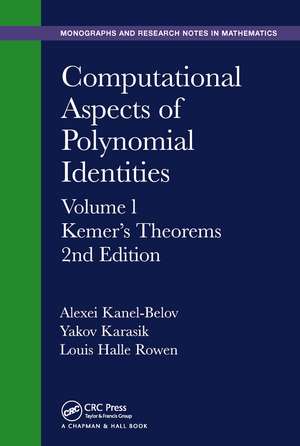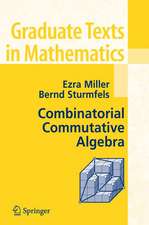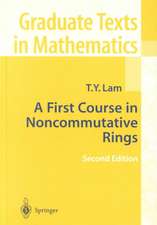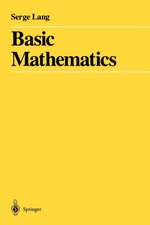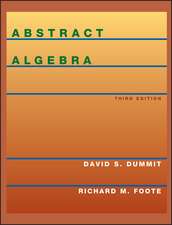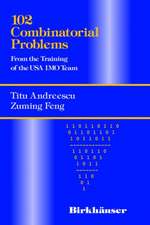Computational Aspects of Polynomial Identities: Volume l, Kemer's Theorems, 2nd Edition
Autor Alexei Kanel-Belov, Yakov Karasik, Louis Halle Rowenen Limba Engleză Paperback – 28 noi 2019
The book first discusses the theory needed for Kemer’s proof, including the featured role of Grassmann algebra and the translation to superalgebras. The authors develop Kemer polynomials for arbitrary varieties as tools for proving diverse theorems. They also lay the groundwork for analogous theorems that have recently been proved for Lie algebras and alternative algebras. They then describe counterexamples to Specht’s conjecture in characteristic p as well as the underlying theory. The book also covers Noetherian PI-algebras, Poincaré–Hilbert series, Gelfand–Kirillov dimension, the combinatoric theory of affine PI-algebras, and homogeneous identities in terms of the representation theory of the general linear group GL.
Through the theory of Kemer polynomials, this edition shows that the techniques of finite dimensional algebras are available for all affine PI-algebras. It also emphasizes the Grassmann algebra as a recurring theme, including in Rosset’s proof of the Amitsur–Levitzki theorem, a simple example of a finitely based T-ideal, the link between algebras and superalgebras, and a test algebra for counterexamples in characteristic p.
| Toate formatele și edițiile | Preț | Express |
|---|---|---|
| Paperback (1) | 489.26 lei 6-8 săpt. | |
| CRC Press – 28 noi 2019 | 489.26 lei 6-8 săpt. | |
| Hardback (1) | 992.63 lei 6-8 săpt. | |
| CRC Press – 23 oct 2015 | 992.63 lei 6-8 săpt. |
Preț: 489.26 lei
Preț vechi: 575.60 lei
-15% Nou
Puncte Express: 734
Preț estimativ în valută:
93.62€ • 100.11$ • 78.06£
93.62€ • 100.11$ • 78.06£
Carte tipărită la comandă
Livrare economică 18 aprilie-02 mai
Preluare comenzi: 021 569.72.76
Specificații
ISBN-13: 9780367445805
ISBN-10: 0367445808
Pagini: 444
Dimensiuni: 156 x 234 x 25 mm
Greutate: 0.58 kg
Ediția:2nd edition
Editura: CRC Press
Colecția Chapman and Hall/CRC
ISBN-10: 0367445808
Pagini: 444
Dimensiuni: 156 x 234 x 25 mm
Greutate: 0.58 kg
Ediția:2nd edition
Editura: CRC Press
Colecția Chapman and Hall/CRC
Public țintă
Professional Practice & DevelopmentCuprins
Basic Associative PI-Theory: Basic Results. A Few Words Concerning Affine PI-Algebras: Shirshov’s Theorem. Representations of Sn and Their Applications. Affine PI-Algebras:The Braun-Kemer-Razmyslov Theorem. Kemer’s Capelli Theorem. Specht’s Conjecture:Specht’s Problem and Its Solution in the Affine Case (Characteristic 0). Superidentities and Kemer’s Solution for Non-Affine Algebras. Trace Identities. PI-Counterexamples in Characteristic p. Other Results for Associative PI-Algebras:Recent Structural Results. Poincaré-Hilbert Series and Gelfand-Kirillov Dimension. More Representation Theory. Supplementary Material:List of Theorems. Some Open Questions. Bibliography.
Notă biografică
Alexei Kanel-Belov is a professor in the Department of Mathematics at Bar-Ilan University. His research interests include ring theory, semigroup theory, polynomial automorphisms, quantization, symbolical dynamic combinatorial geometry and its mechanical applications, elementary mathematics, and mathematical education.
Yakov Karasik completed his doctorate at the Department of Mathematics at Technion - Israel Institute of Technology.
Louis Halle Rowen is a professor in the Department of Mathematics at Bar-Ilan University. His research interests include noncommutative algebra, finite dimensional division algebras, the structure theory of rings, and tropical algebras.
Yakov Karasik completed his doctorate at the Department of Mathematics at Technion - Israel Institute of Technology.
Louis Halle Rowen is a professor in the Department of Mathematics at Bar-Ilan University. His research interests include noncommutative algebra, finite dimensional division algebras, the structure theory of rings, and tropical algebras.
Descriere
This edition presents the underlying ideas in recent polynomial identity (PI)-theory and demonstrates the validity of the proofs of PI-theorems. It gives all the details involved in Kemer’s proof of Specht’s conjecture for affine PI-algebras in characteristic 0. This edition presents a tighter formulation of Zubrilin’s theory and contains a more
